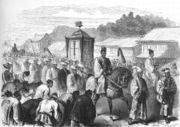
To be clear, I don't think Budo is Bodoh, or stupid in in Bahasa Indonesia , the national language of the country I live in. I'm just not sure what Budo , allegedly the philosophy of the Japanese martial arts means to everyone. I know what it means to me. But like Islam, Christianity, Buddhism, or just what a person thinks is right, I think it's best kept to myself and shown, if possible, through deed, not word.
[In the image above, an etching of when the Japanese emperor shifted from Kyoto to Tokyo as part of the Meiji restoration, a moment perhaps, when Bushido became Budo].
After all, Budo comes from two words, "Bu", meaning martial (or so I'm told), and "do," meaning way, coming from the Chinese character meaning "Tao". And to quote the Tao Te Ching the ancient Chinese text, "the Tao that can be told is not the eternal way." But let's get to the present and away from the past.
I practice, Judo, some Jujutsu, some Brazilian Jiu-Jitsu, and a smattering of other arts, in what is a bundle of modern martial arts. Some traditionalists pour scourn on such training methods and philosophy, saying they are not "budo," or implying that they are designed only for fighting, or to "annihilate the enemy."
That's not how I see it. To me Budo is bowing as you step onto the mat or into the Dojo. It means coming to the Dojo in a clean, pressed gi. It means respecting and not injuring your training partners. Budo means trying your best, maintaining a commitment to constantly improve, share your knowledge and help others do likewise. It means pushing through your physical limits, mental limits, perhaps even touching the spiritual to do so. Budo means trying to keep your body at its best and resisting the dragging, draining strains of modern life.
It's not always clear where these lofty ideas come in when someone 20 kg heavier than you is trying to body slam you, or you're trapped in a triangle choke. But anyone who's trained, quit, trained, washed their gi, done the whole process over a thousand times and keeps coming back to the mat for some reason will know what I mean.
That's what Budo means to me.
You don't have to speak Japanese, know anything about Japanese history, or even Japan to practice Budo. Certaintly a bit of knowledge of the Japanese philosophies and great teachers, including Jigoro Kano, Gichin Funakoshi, even Miyamoto Mushasi might help. But just as Zen is as much about sweeping the yard and washing the dishes as it is about chanting, Budo to me can be found in the hard work on the mat, in overcoming our limitations, and taking those lessons to the rest of our lives.
It's about an attitude, over time. It's not about ranking, grades, seniority. It's about what you practice, not preach. And I know that I'll probably fail more times than I succeed, but with luck get up and try again. That, to me, is Budo.
That's not always what Budo means to everyone.
To the Japanese who invaded Indonesia and Southeast Asia, enslaved its women, and turned it into a mine and forced-labor farm, maybe Budo meant something else. Given the two-samurai swords in many of their photos and symbols of the rising sun, it would seem they practiced what they thought was "Budo," perhaps seeing themselves as warriors of civilization, defined as Japan and the Emperor.
I'm sure some of those Japanese and I have a few things in common in our interpretation. But we obviously have our differences.
For the feudal Japanese Samurai, Budo, or its incarnation at that time, Bushido, meant a whole range of things it wouldn't now. The Samurai, the guardians of Bushido, were known to behead commoners for not bowing to them, and regularly committed acts that would today be regarded as murder, it not sociopathic homicide.
Some people think Budo means dressing up in Hakama, maintaining strict Sensei-Sempai-Kohei relations, and rigid rules of Japanese etiquette. Sometimes, whatever the Sensei says is Budo can be Budo. Or so it would seem to me.
Here's what Wikipedia says about Bushido.
Budo seems to mean different things to different people, especially taken out of a Japanese context by people who don't speak Japanese or perhaps have never even been there.
That's why I don't talk alot about Budo.
There is a danger that Budo can be turned and twisted to mean all sorts of things. Just as uneducated Muslims or Christians or Buddhists can be duped by unethical religous teachers warping the meanings of the obscure and mysterious holy texts written in a foreign language, martial artists can be tricked by those who'd claim to speak for Budo.
I'm not qualified to say what is and what isn't a martial art. For me, training in Judo, Jujutsu, in Yoga, in the gym, even running in a forest is about doing my best, training the spirit and not just body overcoming personal limitations.
Perhaps that's Budo, perhaps Bodoh.
1 comment:
Nice post, and I agree that Budo is better shown than spoken ... anyways here's a lighter post of the day, check out
http://www.tacticalkravmaga.com.au/Classes.htm.
Under recent law enforcement and civilian instructor course, sweeeeeeeet!
Post a Comment